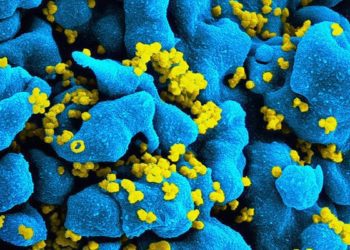Study highlights trends and outcomes of bronchodilator use in infants with bronchiolitis
1. In a large retrospective study, the rate of bronchodilator use during emergency visits for infants with bronchiolitis decreased from 51.5% to 22.8% between 2010 and 2018.
2. High versus low rates of early bronchodilator use at a hospital level were not associated with a statistically significant difference in rates of hospital admissions, ICU admissions, return ED visits, or ventilatory support.
Evidence Rating Level: 2 (Good)
Study Rundown: Bronchiolitis is a common lower respiratory tract infection and is one of the leading causes of hospitalization in infants. The American Academy of Pediatrics (AAP) recommends against the routine use of bronchodilators in managing bronchiolitis based on extensive literature showing that they are not beneficial. In this study, researchers examined trends in bronchodilator use and outcomes between 2010 and 2018 in a large cohort (>450,000 ED visits) of infants with bronchiolitis. Bronchodilator use decreased by about two thirds, and there was a small but significant decrease in hospital admissions and repeat ED visits within 3 days of initial discharge during the study period. However, there were also increases in intensive care unit (ICU) admissions, noninvasive ventilation, and invasive ventilation. It is possible that decreased bronchodilator use played a role in this increased need for intensive support, though causation could not be determined from the study given its design. In comparing hospitals with the highest versus lowest rates of bronchodilator use, there were no significant differences in outcome measures. The large sample size and multi-center design strengthen the generalizability of this study, although its retrospective database design precludes determination of causality. Overall, it supports previous literature in showing that bronchodilators likely have a limited role in the management of acute bronchiolitis.
Click to read the study in Pediatrics
Relevant Reading: Therapeutic strategies for pediatric bronchiolitis
In-Depth [retrospective cohort]: This was a retrospective study across 49 tertiary pediatric hospitals in the United States. Data were obtained from a centralized administrative database, the Pediatric Health Information System. Infants <12 months old presenting to the ED with bronchiolitis from 2010 to 2018 were included; patients with complex chronic diseases were excluded. The median age was 5 months, and 32% of patients overall received bronchodilators. Bronchodilator use decreased from 51.5% to 22.8% (OR 0.83 for linear trend by year). Hospital admissions increased from 2.4% to 4.3%, ICU admissions increased from 2.4% to 4.3%, and repeat ED visits decreased from 5.9% to 5.2%. Noninvasive ventilation increased from 1% to 2.9% (OR 1.15), while invasive ventilation increased from 0.7% to 1.5% (OR 1.06). All of these changes were statistically significant. 111,310 infants were included in the outcomes analysis, divided into two groups based on treatment at hospitals in the highest and lowest quartiles of bronchodilator use on the day of ED presentation. High-use hospitals also had lower overall admission rates from the ED, higher ED volumes, and higher median bronchiolitis severity (based on APR-DRG scores). Although none of the between-group differences were statistically significant, hospitals with high bronchodilator use had lower hospital admissions (32.0% vs. 33.6%), higher ICU admissions (4.7% vs. 3.2%), higher return ED visits (5.7% vs. 5.0%), higher noninvasive ventilation (2.6% vs. 0.8%), and higher invasive ventilation (1.1% vs. 0.1%).
Image: PD
©2021 2 Minute Medicine, Inc. All rights reserved. No works may be reproduced without expressed written consent from 2 Minute Medicine, Inc. Inquire about licensing here. No article should be construed as medical advice and is not intended as such by the authors or by 2 Minute Medicine, Inc.







